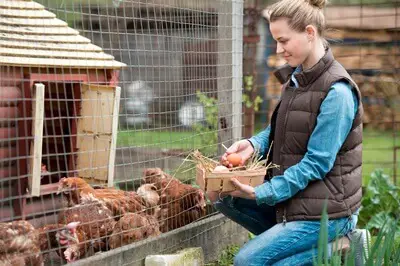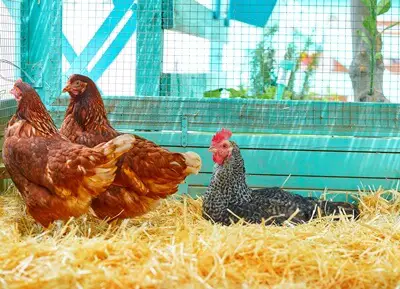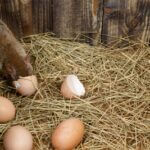Rats are drawn to a warm chicken coop’s food, water, and shelter. Food scraps, feed, poop, eggs, and baby chicks are ideal for rodents. So, you need to keep rats away from chickens.
To rat-proof a chicken coop, remove or cover chicken feeders and watering stations each evening.
Store chicken feed away from the coop and keep it in airtight containers. Replace chicken feeders with treadle designs. Clean up leftover food, tidy up clutter, and remove chicken poop daily.
Pair this with collecting eggs frequently and monitoring your chickens while eating kitchen scraps. Trim any shrubs or trees around the chicken coops so that rats don’t nest nearby.
If you use chicken manure in your garden, check for rat nests.
Avoid the use of snap traps or poisons, as this can kill your chickens.
Does Raising Chickens Attract Rats?
Rats aren’t attracted to chickens, but they like their feed, droppings, eggs, and used litter.
According to Harvard Medical School, rats have a strong sense of smell. This powerful olfactory system allows them to trace the smell of chicken feed in a coop from a distance away.
Rats like eating bird eggs, including chicken eggs. They’ll even eat baby chicks if food is scarce.
In an emergency, animal and chicken droppings contain trace nutrients that can sustain rats.
Also, the wood shavings in the chicken coop to collect feces are chewing material for rats. Their teeth never stop growing, so rats need to gnaw on abrasive materials to wear down their teeth.
Do You Get Rats If You Have Chickens?
You may get rats if you have chickens, as rats are attracted to the resources you provide chickens, alongside the waste they create.
Good sanitation in a coop can prevent rodent infestations, so clean your chicken coops regularly and store leftover chicken feed in airtight containers.
Rat-proofing a chicken coop can prevent rats from gaining access to the resources.

Why Do Chickens Attract Rats?
Rats like to stay in warm places where they can access food and water easily. So, raising chickens can attract rats and other rodents if you don’t keep the coop clean.
Chicken pens offer a suitable place for rats for the following reasons:
- Warm area to sleep and rest
- Secure place to raise their young
- Ample supply of food
- Clean and readily available water
Signs That You Have Rats In Your Chicken Coop
Wild rats are nocturnal, and they rarely come out in the daytime.
You’ll rarely see rats moving freely around a chicken coop during the day. If you see 1-2 rats during the day, you likely have a large infestation.
Here are the signs of rats:
Rat Droppings
Rat droppings are ½ – ¾ of an inch long and rounded at each end. Rat poop is sausage-shaped.
New rat poop will look shiny, while old poop will appear grey and crumbly.
Here’s how to tell rat and mouse droppings apart.
Rat Trails
Rats are foraging animals, leaving trails and markings that lead to food sources. The trails are usually visible to enable the rat to find its way back to the food source.
Rats always use the same trusted routes when scavenging for food. If you notice trails of poop or thin trails around a kitchen coop, you’re likely dealing with a rat problem.
Chewing Damage
The most conspicuous signs of a rat are gnawing marks and chewing damage.
According to Animal Learning and Behavior, gnawing activity is a survival mechanism. Rats chew through various materials to get out of tricky situations or access food stores.
Rats also chew objects constantly to trim down their ever-growing teeth. If your chicken coop is well-designed, rats will attempt to get in by chewing the wood outside, leaving visible gnaw marks.
Holes Around The Coop
Another clear sign of a rat infestation is the presence of burrows around the coop. Rats are excellent borrowers, and they usually dig holes near food and water sources.
If your chicken coop is sealed, rats will dig holes beneath to gain access. They’ll also dig burrows on the ground inside the coop if you have a dirt floor. Most holes measure 2-3 inches in diameter.
Missing Eggs
Rats will eat chicken eggs, as they’re high in protein (amino acids). You may also find that rats egg chicken eggshells as they’re a good source of calcium.
You may find that the presence of rats stresses chickens, so they stop laying eggs.
If there are fewer eggs or eggs are vanishing, this could be due to rats.
Missing Chicks
Rats rarely attack chickens, but they’ll do so in the event of food scarcity.
The rats will target chicks because they’re small and vulnerable. This will happen predominantly at night, wherein the rats will drag them from under their mother or out of their heating tubs.
Missing Feed
The average chicken consumes one quarter-pound of food per day. If leftovers are present in the chicken coop, rats will have a ready meal.
Take note if your chicken feed is running out faster than expected.
Maimed Chicken Feet
Although rare, rats can bite and chew your chickens’ feet while they sleep. Rats normally do this by trying to eat the droppings stuck between a chicken’s toes.
A rat’s bite strength and sharp teeth can cause serious damage. This may harm your chickens, leaving their feet maimed. Resulting infections and loss of mobility can lead to premature death.
How To Keep Chickens Without Rats
Rats usually enter a chicken coop for food, water, and shelter. So, you can deter rats from a chicken coop by restricting access to these essentials in the following ways:
Maintain Good Sanitation
Clean up any spilled feed to eliminate rats’ primary source of food. Also, don’t allow chicken poop to accumulate, as rats can glean nutrients from chicken waste.
You should also get rid of clutter to prevent rats from sheltering in the coop. This can include spreading out wood shavings to ensure no obvious nesting piles.
Store Chicken Feed Appropriately
Rats enter chicken houses mainly because they can’t resist the smell of chicken feed. They have impressive bite strength, capable of gnawing through:
- Plastic
- Cardboard
- Fabric
- Bags
- Certain metal
Store your chicken feed in thick, uncompromised metal bins with a secure lid. Ensure they’re a few inches thick and have a hardness level above 6 on the Mohs scale.
Also, you can use glass as airtight containers since rats can’t chew through this material.
Remove Feeders And Watering Stations At Night
Temporarily remove chicken feeders and watering stations from the coop each evening. After all, chickens don’t eat or drink at night, so any leftover feed will attract rats and other rodents to the coop.
Covering the feeders can be beneficial, but rats can gnaw their way through plastic, wood, and certain metals that are softer than their teeth.
Rat-Proof The Coop
If the coop is made of wood or plastic, rats will likely chew until they get inside.
To secure your coop, ensure that it’s raised from the ground to prevent access from underneath. Also, fit the coop with galvanized wire mesh and ensure no gaps between the doors and frames.
Collect Eggs Frequently
Food scarcity will force rats to steal and eat freshly laid eggs. This can result in your chickens not laying eggs daily or the number of eggs being fewer than expected. Counter this by gathering any eggs.
Dispose of Trash Correctly
Many people store trash cans in their yard or use chickens to clean up leftover food scraps. However, decomposing garbage and food scraps will attract rats.
If there’s a chicken coop nearby, rats will likely migrate from the trash cans to your poultry pen, searching for better food. They’ll feast on the leftovers you offer your chickens.
Dispose of trash in metal bins with tight-fitting covers. Ensure that compost pits are secured to prevent rats from building their nests.
Cover Rat Holes
As mentioned, rats are great burrowers. They like to dig holes and tunnels near their nests and food sources. These holes provide a safe haven.
Covering rat holes with steel wool will prevent them from coming out. Also, fix gnawing damage.
Trim Shrubs And Trees
Rats prefer to build their nests in bushes, shrubs, and under piles of leaves, clothes, and paper. So, trimming shrubs and trees and mowing your lawn can prevent rats from living near your chicken coops.

Are Rats Dangerous To Chickens?
Rats are most dangerous to chickens at night when rats are most active and chickens are at their most vulnerable. The main risk rats pose to chickens is physical injury and disease.
Can Chickens Get Diseases From Rats?
According to the University of British Columbia, rats carry avian pathogenic E. coli.
Colibacillosis is a common disease among chickens and leads to elevated mortality levels. The study found that the bacteria are drug-resistant.
Rats also carry other diseased pathogens, such as salmonella and leptospirosis. These organisms are dangerous to poultry and humans.
Rats also host fleas and mites that spread diseases, such as typhus and the bubonic plague.
Will Rats Eat Chickens?
Large-sized rats will sometimes attack and eat chickens, but only when they run out of food. Starvation and food scarcity force rats to seek alternative means of sustenance.
However, large chickens put up too much of a fight. So, rats will settle for other meals to scavenge until their survival instincts demand otherwise.
Rats will attack and eat baby chicks since they’re weaker and more vulnerable.
Do Rats Eat Chicken Eggs?
Rats enjoy eating birds’ eggs, but only when it’s safe. A rat doesn’t want to challenge a mother hen for her chicks but may attempt to steal eggs during the night.
Do Rats Stop Chickens From Laying Eggs?
The presence of rats in or around your chicken coop will stress chickens and affect their reproduction cycle. So, they’ll stop laying eggs due to higher stress levels.
According to the Journal of Experimental Zoology, stressed chickens lay eggs with high corticosterone levels, which affects if the eggs hatch. If the eggs do hatch, they’ll lead to less healthy offspring.
How To Feed Chickens Without Attracting Rats
Rats are attracted to chicken feed, eggs, and droppings, so here are some ways to limit the draw:
Store Chicken Feed in Airtight Metal Containers
If you leave your seed or grain in easy-to-reach places, rats arrive.
To prevent this, store your feed in airtight glass and metal containers. Avoid plastic containers since determined rats can gnaw through plastic and access the feed.
Treadle Feeder And Drinker
Treadle feeders are made using galvanized metal and have a lid that opens automatically when the chicken stands on the treadle step. Then, it closes when it steps away.
Since treadle feeders are composed of thick metal, rats can’t chew their way in.
Remove Leftover Food And Water At Night
Rats are nocturnal animals, so they’re more active at night.
They’ll be attracted to any chicken feed or water left in the coop. So, always remove any leftover food and water so that rats are less likely to show an interest in your poultry.






